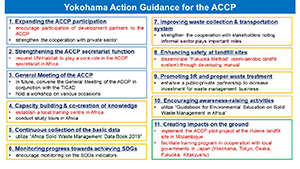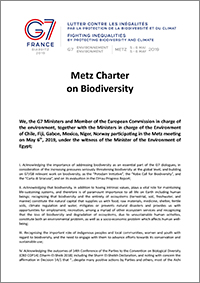Current Topics
2nd General Meeting of the African
Clean Cities Platform and TICAD7
Toward Clean and Healthy Cities in Africa!
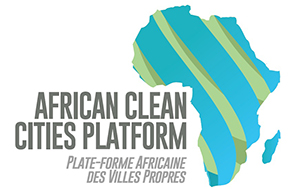
The Ministry of the Environment, together with the Japan International Cooperation Agency (JICA), Yokohama City, United Nations Environment Programme (UNEP) and United Nations Human Settlements Programme (UN-Habitat), held the “2nd General Meeting of the African Clean Cities Platform (ACCP)” on 26-27 August as an official side event of the Seventh Tokyo International Conference on African Development (TICAD7) on 28-30 August, in Yokohama. Approximately 400 people participated including representatives from 38 African countries, making the meeting the largest among the numerous official side events of TICAD7.
Summary of the 2nd General Meeting of the ACCP
On the first day, State Minister of the Environment, Tsukasa Akimoto, gave the opening address, emphasizing the importance of contributing to improved waste management in African countries through the sharing of Japan’s systems and technologies. Subsequently, Japanese companies interested in developing business in Africa introduced their technologies and business activities via presentations and booth displays. Likewise, the “Guidebook for Environmental Education on Solid Waste Management in Africa”, a report prepared by JICA that highlights environmental education activities in Africa, was released. Lastly, Parliamentary Vice-Minister of the Environment, Takaaki Katsumata, gave remarks, stressing the importance of improving citizens’ awareness on separation and reduction of waste through environmental education.
On the second day, the “Africa Solid Waste Management Data Book 2019”, prepared by JICA, was released, and the need for ongoing collection and updating of basic data was confirmed. Moreover, discussions took place on the need for fund mobilisation and raising the priority of waste management in African countries in order to achieve improvements in the field. At the High Level Session, representatives from African nations, participating cities and international organisations gave their high level statements. Minister of the Environment of Japan, Yoshiaki Harada, highlighted the following three areas in particular for strengthening measures to contribute to improved waste management in Africa.
(1) Strengthening the ACCP secretariat function: Because ACCP is a platform for African nations, it is important to enhance ownership by African nations and to move the axis of activities to Africa. Accordingly, UNHabitat, headquartered in Africa, taking on the core role in the ACCP Secretariat in Africa will lead to strengthening of the secretariat function.
(2) Enhancing safety at landfill sites: Most African countries are unable to respond to increasing amounts of solid waste, causing waste to pile up. Thus, landfills are faced with various problems including fires, landfill collapse and environmental pollution. Japan has developed the Fukuoka Method, a simple, low-cost technology to enhance safety and improve environments at landfills, and has a history of introducing this technology. An ACCP pilot project is to be implemented at the Hulene dump site in Mozambique in an aim to enable active application of the Fukuoka Method to address related problems in African countries. The lessons learned from this project will be compiled into a manual to be shared with African countries, aiming to disseminate the Fukuoka Method.
(3) Capacity Building: In order to engage in appropriate waste management, development of related laws and human resources to carry out operations are essential. With the aim of developing such human resources, Japan is promoting the establishment of a training center in Africa, in addition to implementing trainings in Japan for learning from Japan’s experiences and technology. Likewise, Japan is partnering with local governments that have extensive experience in waste management, including Yokohama City, Tokyo Metropolitan Government, Osaka City, Fukuoka City and Kitakyushu City, to implement more effective capacity building.
Outcomes of the 2nd General Meeting of the ACCP
Lastly, as an outcome of the meeting, the “Yokohama Action Guidance for the ACCP”, which stipulates the future direction of ACCP activities, was adopted. The outcomes of the meeting were input at TICAD7, moving further forward in promoting waste management in African countries.
Waste Management Project in Mozambique
The Fukuoka Method (semiaerobic landfill) will be introduced at the Hulene dump site in Maputo City of Mozambique as an ACCP model project. This method, a technology for landfill management developed in Japan, is designed to facilitate the decomposition of waste by creating paths for air and water within the landfill, to stabilise the landfill to prevent collapse and fire, and to purify leachate. The project is scheduled to commence in November of this year.
Outcomes of TICAD7
The government of Japan has been leading the TICAD conference since 1993, co-hosted by the United Nations, United Nations Development Programme (UNDP), World Bank and the African Union Commission (AUC).
In his address at the opening session, Prime Minister Shinzo Abe described ACCP as, “a platform by which Japan, 36 countries in Africa, and a host of UN organisations join forces, aiming at reducing, reusing, and recycling waste in African cities. It is a kind of undertaking that takes decades, not years.”
State Minister of the Environment, Minoru Kiuchi, participated in a session on climate change and disaster risk reduction on 29 August to provide information on, (1) the necessity of creating plans adjusted to the differing situations and needs of regions based on the latest scientific knowledge on climate change predictions within comprehensive measures to address adaptation and disaster prevention; and (2) support provided to establish the Educational Partnerships for Innovation in Communities (EPIC) Africa, to enhance the resilience and sustainability of cities as a part of activities based on the G20 Action Agenda on Adaptation and Resilient Infrastructure adopted at the G20 Ministerial Meeting on Energy Transitions and Global Environment for Sustainable Growth held in Karuizawa, Nagano on June 15 and 16. State Minister Kiuchi also called attention to the initiatives of the ACCP.
The Leaders’ Declaration (Yokohama Declaration 2019) adopted on 30 August incorporated intentions to “emphasise the need to address other pressing environmental issues such as reducing marine plastic litter and pollution, Illegal, unreported, and unregulated (IUU) fishing, and promoting the utilisation and sustainable use and conservation of biodiversity, clean water and sanitation, as well as waste management” in a section on “deepening sustainable and resilient society”.
More Information:
G7 Environment Ministers’ Meeting and the Metz Charter on Biodiversity
At the G7 Environment Ministers’ Meeting, held in Metz, France, on 5-6 May, Japan’s Minister Harada spoke on Japan’s initiatives and contributed to the adoption of the Communique and Charter on Biodiversity.
G7 Environment Ministers’ Meeting in Metz, France
Minister Harada advised on the following initiatives at the G7 Environment Ministers’ Meeting.
(1) Ahead of the G20 Ministerial Meeting on Energy Transitions and Global Environment for Sustainable Growth on 15-16 June, Japan, to contribute to achieving the 1.5ºC target, will formulate a long-term strategy based on the Paris Agreement that aims for a “decarbonised society” as early as possible in the latter half of this century. Moreover, Japan is advancing measures ahead of other nations to control the emissions of fluorocarbons, including revision of the “Fluorocarbons Emission Restraining Law”.
(2) Japan will aim to construct an effective framework involving emerging and developing countries to address the problem of marine plastic litter at the G20 in June.
(3) Concerning biodiversity, Japan will actively contribute to discussions on new global targets to ensure that initiatives under the Aichi Targets are continued and further developed. Further, based on the revised Natural Environment Conservation Law approved in the Diet last month, Japan will establish offshore seafloor nature conservation areas toward April next year, when the law takes effect, to contribute to achieving Aichi Targets related to protected areas.
In subsequent follow-up, concerning (1), a cabinet decision was made on 11 June on the “Long-term Strategy under the Paris Agreement”. Concerning (2), an agreement was reached on the “G20 Implementation Framework for Actions on Marine Plastic Litter” at the G20 in June. Likewise, at the subsequent G20 Osaka Summit, the “Osaka Blue Ocean Vision” that aims to reduce additional pollution by marine plastic litter to zero by 2050, was shared.
Charter on Biodiversity
Concerning (3), the “Metz Charter on Biodiversity” was adopted at the G7 Environment Ministers’ Meeting. The Charter includes the decision that the G7 nations and other stakeholders make commitments on biodiversity and support the development and implementation of a post-2020 global biodiversity framework. As the host nation of the Convention on Biological Diversity COP10 that took the lead in the adoption of the Aichi Targets, Japan will continue to actively contribute to the development of the post-2020 global biodiversity framework based on the Charter.
Strengthening Measures
on Fluorocarbons
and International Expansion
Life-cycle Managment of Fluorocarbons
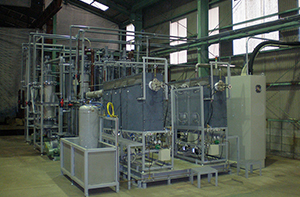
Fluorocarbon destruction device of the same type as that to be introduced in Vietnam
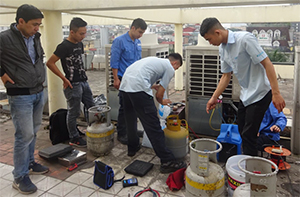
Scene of fluorocarbon recovery in Vietnam
This article will introduce Japan’s domestic measures on addressing fluorocarbon emissions and initiatives in the international expansion of the life-cycle management of fluorocarbons.
Japan’s measures to address fluorocarbons
Fluorocarbons are substances utilised as refrigerants in mainly air conditioners, refrigerators and other freezing equipment that are quite familiar in our everyday lives. Among these, CFCs and HCFCs cause depletion of the ozone layer. While HFCs do not deplete the ozone layer like CFCs and HCFCs, they are strong greenhouse gases (from hundreds to more than 10,000 times stronger than carbon dioxide). Thus, control of fluorocarbon emissions is extremely important from the perspectives of both ozone protection and global warming mitigation.
Japan has two laws to regulate fluorocarbons. The “Act on the Protection of the Ozone Layer Through the Control of Specified Substances and Other Measures” regulates production and consumption of fluorocarbons based on the Montreal Protocol. The “Act on Rational Use and Proper Management of Fluorocarbons” provides comprehensive approaches throughout the life-cycles of fluorocarbons. To promote transitions to low-GWP (Global warming potential) or nonfluorocarbon refrigerants, a system of Designated Products is also provided by this law. To reduce emissions due to leaks from equipment, users of commercial refrigerators and air conditioners are obligated to carry out periodical inspections of their equipment. They are also required to report the annual total amount of leakage if it exceeds a certain amount. Efforts made and measurements taken to reduce leakage from equipment are reported to encourage other users. Also, to prevent discharge into the air upon disposal of equipment, users are required to recover and appropriately destruct or recycle fluorocarbons from all commercial equipment.
In addition to regulations based on laws, the Ministry of the Environment and the Ministry of Economy, Trade and Industry promote the development of low-GWP or nonfluorocarbon refrigerants, as well as the development and introduction of products that use these refrigerants.
Toward global countermeasures on fluorocarbons
An examination of global trends in fluorocarbon countermeasures reveals that although countries are regulating manufacture and import based on the Montreal Protocol, initiatives in recovery and disposal from equipment using fluorocarbons have not always been put in place. On top of remaining HCFCs and CFCs, the amount of global emissions of HFCs is expected to increase from about 900 million t-CO2eq to about two billion t-CO2eq in 2030, around 6% of the amount of energy-related CO2 emissions of the world, even if all Parties comply with the requirements of the Kigali Amendment. For this reason, it is necessary to promote proper management of fluorocarbons throughout their life-cycles, including recovery, recycling and destruction, on a global scale.
Japan has already started implementing demonstration projects with Thailand and Vietnam since 2018 to recover and destruct fluorocarbons using the Joint Crediting Mechanism (JCM) scheme. We aim to expand initiatives to address the life-cycle management of fluorocarbons and to contribute to reducing fluorocarbon emissions worldwide.



